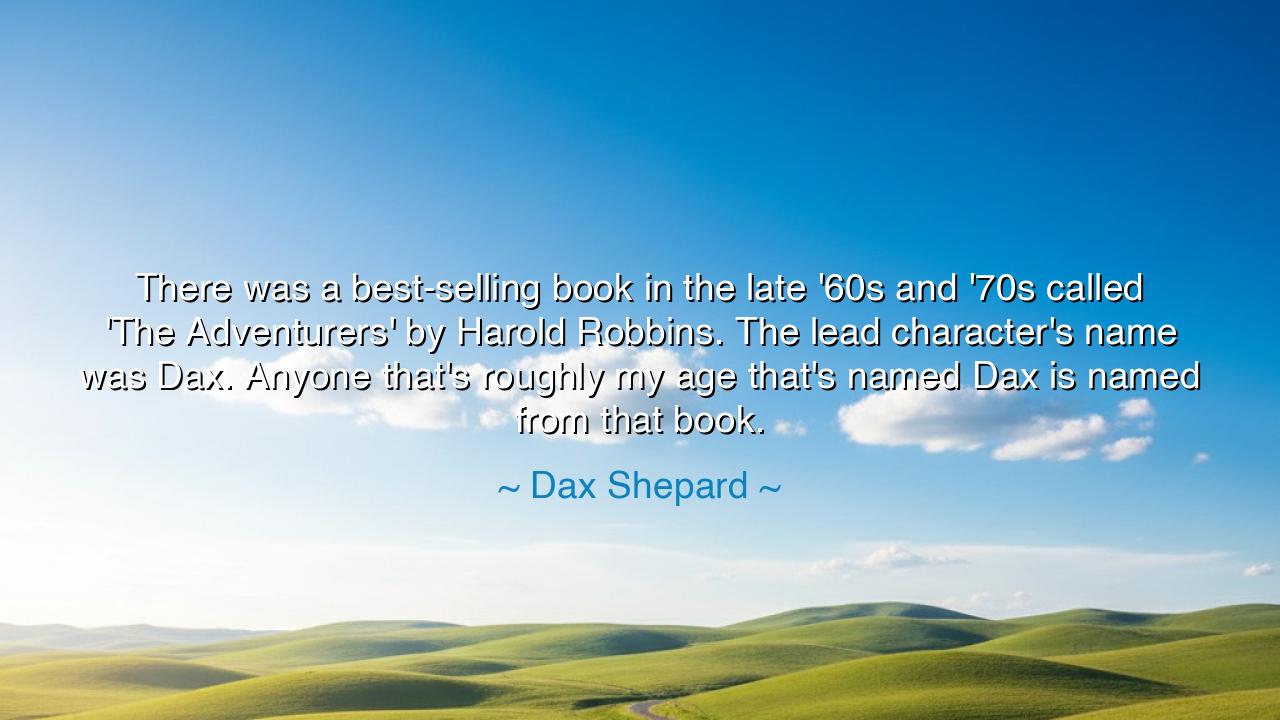
There was a best-selling book in the late '60s and '70s called
There was a best-selling book in the late '60s and '70s called 'The Adventurers' by Harold Robbins. The lead character's name was Dax. Anyone that's roughly my age that's named Dax is named from that book.






The actor and storyteller Dax Shepard, known for his humor and candor, once reflected upon the origin of his name, saying: “There was a best-selling book in the late '60s and '70s called ‘The Adventurers’ by Harold Robbins. The lead character's name was Dax. Anyone that's roughly my age that's named Dax is named from that book.” To the casual listener, this may seem but a passing remark — a simple note about a name and a novel. Yet within this statement lies something deeper: a meditation on identity, inheritance, and the mysterious ways stories shape our lives. For in speaking of his name’s origin, Shepard reminds us that none of us are born from nothing; we are each threads spun from the loom of culture, memory, and imagination.
The origin of this quote lies in Shepard’s reflections on how his name — unusual, bold, and resonant — came not from his family’s history but from a work of fiction. In the 1966 novel The Adventurers, written by Harold Robbins, the protagonist, Dax Xenos, was a figure of charisma and rebellion — a man molded by passion, ambition, and the turbulence of his times. Robbins’ novel, one of the best-sellers of its era, captured the spirit of the late twentieth century: an age of daring, of experimentation, of the breaking of rules. Parents who read the book saw in the name Dax a spark of that same daring spirit — and they passed it on to their children, unknowingly passing down not merely a sound, but an idea. Thus, the name became a vessel of character and aspiration, a symbol of adventure and individuality.
To be named after such a creation is to carry the echo of fiction into one’s own reality. Shepard’s remark, half-humorous and half-humbled, reveals an awareness that our lives are often shaped by the stories that came before us. The ancients would have understood this well. They named their children after heroes and gods — not merely to honor the past, but to invoke its power, to give their offspring a link to greatness, a map for their own becoming. In the same way, modern parents, reading the tales of Robbins, perhaps sought to give their sons a name that sounded fearless, capable, alive with energy. The name Dax became a modern rune — a syllable charged with the spirit of adventure.
Throughout history, names have been more than labels; they have been prophecies. Consider the tale of Alexander, named for “the defender of men.” His destiny seemed to follow his name, as if the sound itself carried the weight of empire. Or Helen, whose name meant “light,” and whose beauty ignited the fires of mythic war. So too, Shepard’s reflection invites us to see how our own names, our identities, are bound to the stories that gave them birth. A name is not merely chosen — it is received, carrying with it the dreams of those who spoke it first. It is a seed of meaning that grows within us as we live our lives, shaping how we see ourselves and how the world sees us.
Yet Shepard’s quote also hints at a truth beyond names: that we are all born into the stories of others. Even if our names are not drawn from novels, we are still shaped by the books our parents read, the music they cherished, the heroes they admired, and the dreams they whispered into the night. We inherit not only their blood, but their imagination. To understand one’s name — whether literal or symbolic — is to begin to understand one’s place in the river of human storytelling. Shepard’s awareness of his literary namesake is an act of gratitude, a recognition that every life stands upon the shoulders of the tales that came before it.
The meaning, then, is both personal and universal. Shepard’s comment is not about vanity, but about continuity — how art seeps into life and life, in turn, gives art new meaning. The character Dax Xenos may have been imagined by Harold Robbins, but through generations of readers and children who bore his name, that character’s essence crossed into reality. In this way, fiction becomes flesh, and the dreams of one man ripple through time to inspire others. It is a reminder that the stories we tell matter — for they plant seeds in the hearts of people we will never meet, shaping the very fabric of future generations.
The lesson, therefore, is this: know the story of your name — and if your name carries no story, make one worthy of it. Live so that your name, too, becomes a tale others will remember, not for fame, but for meaning. Understand that you are the heir of imagination, born into a world built by words and dreams. When you know where you come from, you walk with greater purpose; when you understand the stories behind your life, you begin to write your own with reverence and courage.
Thus remember, O bearer of a name, that your life is a chapter in a vast and eternal book. The heroes of the past, the characters of fiction, the artists and poets who lived before you — they have all lent you their breath. Whether your name comes from a myth, a story, or a whisper between parents long ago, carry it with pride. For in living your truth, you give that name — and the story that birthed it — new life. So live boldly, as your ancestors and storytellers once dreamed you would. Live as the adventurer you were always meant to be.






AAdministratorAdministrator
Welcome, honored guests. Please leave a comment, we will respond soon